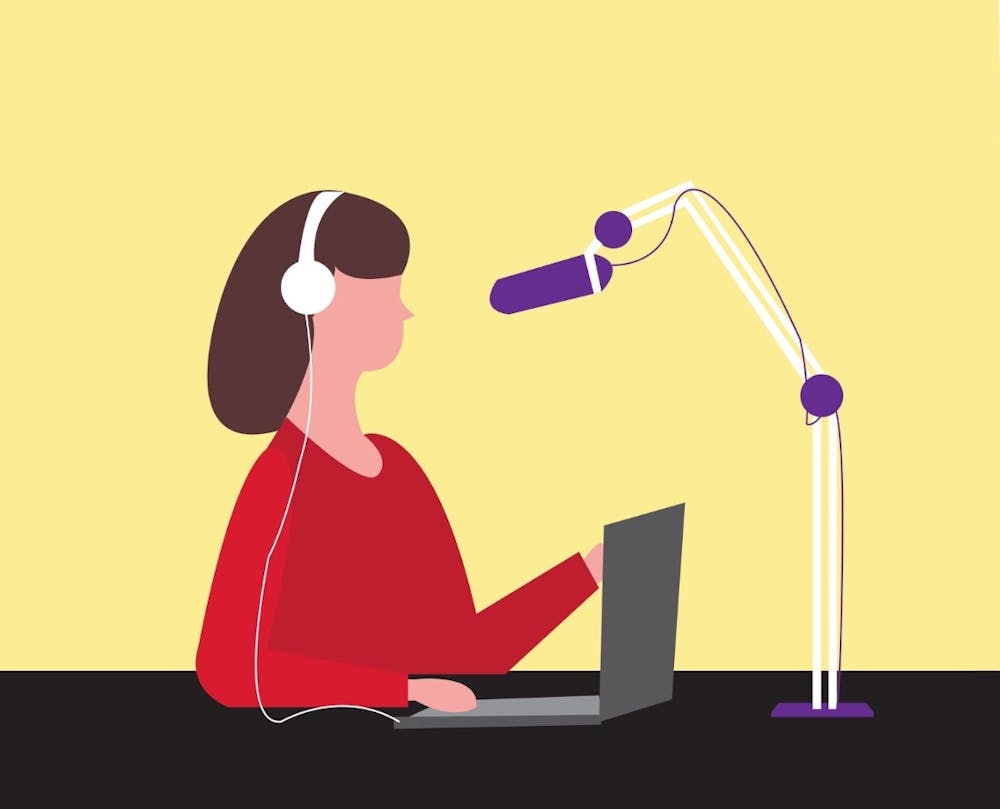Podcasting is having a moment. The lower–budget, easily accessible, and even more easily digestible content has drawn creators, listeners, and of course advertisers over the last several months as people turn away from radio and even TV to reach for their headphones.
Statistics released by Spotify on International Podcast Day (Sept. 30) indicate that the number of new shows added to the platform increased by 240%, but even more revealing, that comedy took the lead for the most–listened–to category this year. In a time where people across the globe are actively seeking out even the smallest crumbs of serotonin, this might not be a shocking revelation. Regardless, there seem to be three key factors taking the lead amongst others that have brought about this never–before–seen growth in the podcast industry.
Cost
Creators and social media stars are becoming wary of their budgets as the pandemic makes the economy ever more volatile, and podcasts are a relatively cheap alternative to other forms of media. That being said, the cost factor does not by any means apply only to well–established creators—new podcasters are picking up microphones at their local electronics stores for less than the price of a pair of sneakers and hitting records in their basements, living rooms, or backyards. And with free versions of Spotify, Apple Podcasts, Amazon Music, and more, their listeners don’t even have to pay to enjoy this content and can enjoy the cost–free benefits of podcasts themselves. Monetary cost isn’t all that matters, though; it also takes far less time and effort to record and edit a podcast than it does to film and edit a YouTube video, let alone a TV series or a movie.
Accessibility
Podcasting is accessible to the average person not just because it takes less time, effort, and money to sustain than many other media platforms, but also because the nature of a newly booming social media industry is such that huge creators from other platforms haven’t yet dominated the space. Twitter, Instagram, and other social media sites, for example, are now geared towards promoting already large content creators, usually from YouTube, TikTok, or other media.
Although the podcasting industry is already shifting towards this, as big creators and social media influencers like Emma Chamberlain, Josh Peck, Rhett and Link from Good Mythical Morning, and many, many more bring a huge following to their podcasts, podcasting is still (for now) an accessible forum for small independent creators to gain a following. For example, one of the most widely listened to podcasts of 2020 is the comedy podcast Call Her Daddy. The Barstool Sports show is a racy, unfiltered series of conversations between the host, Alex Cooper, and her former co–host Sofia Franklin, about what they call “uncensored, real, female locker–room talk.” Prior to the premiere episode of the show in 2018, the two were nowhere near the public eye, but, to date, their podcast remains (as it has for months) at the top of charts across Spotify, Apple Podcasts, and more, paving the way for other lesser–known creators with uniquely educational or entertaining content to show the world.
People are Just Bored
However, there's one question that hasn’t yet been addressed: If the appeal of the low cost and high accessibility for podcasts (and podcasting) is so great, then why hasn’t the podcast industry blown up before now? The answer becomes clear in the context of the third factor: The consumer audience for podcasts absolutely exploded as soon as quarantine hit. People were (and still are) bored, stuck inside, and seeking some joy or distraction in an often dreary and repetitive pandemic routine.
Honestly, it’s no wonder people are gravitating towards a podcast that once said in its description that “whether you want to finesse the f*ckboy, upgrade your dating profile, or learn how to give a mean blow job/eat p**** like a pro, they’ve got you covered,” among plenty of other slightly less raunchy, but equally entertaining comedy podcasts like the Joe Rogan Experience or Armchair Expert with Dax Shepard for some laughs and entertainment in their down time. Listeners are by no means limiting themselves to the comedy genre, though—they’re also turning to educational, inspirational, or simply fascinating shows like The Michelle Obama Podcast, Pod Save America, and more.
Taking all this into consideration along with the exceptionally depressing current political and social climate, it would seem that podcasts, specifically comedy podcasts, and podcasting as a job or as a hobby are here to stay for the duration of the pandemic and far beyond. If you’re looking for a podcast to start with check out Spotify’s Best of 2020 So Far playlist, or Street’s quarantine podcast roundup.







